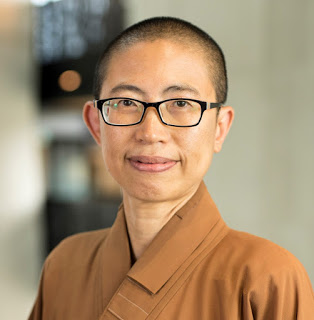
Speaker: Venerable Dr. Juewei
Head of Program, Humanistic Buddhism Director,
Humanistic Buddhism Centre Lecturer,
Applied Buddhist Studies of Nan Tien Institute (NTI) in Australia
I. Introduction
Auspicious greetings, my friends in the Dharma! I am Juewei from Australia’s Nan Tien Institute. How have you been? And how are you now?
I often wonder if my friends around the world are keeping themselves safe and well. I wish very hard that everyone can gain access to basic provisions and healthcare; that every healthy person is now exercising, getting adjusted to a new routine, and recalibrating themselves in the Dharma; and that every sick person gets sufficient care and rest. Most importantly, that we can always recall the Buddha, the Dharma and the Sangha. For isn’t Buddhism or any other religion for that matter about reducing suffering?
Covid-19 is giving us that very opportunity—to be compassionate, to make wise decisions, and to persevere on good causes against all odds. Indeed, each time I hear my own voice, I remind myself that today is yet another chance for me to be a little better to myself and to others around me.
So, today, I would just like to share with you some mischief that I have treated myself to in the past few weeks and the Dharma lessons I have learned.
II. An Art of Heart
First, I learned to celebrate little successes. On 8th March this year, I celebrated the completion of my lecture materials for NTI’s Buddhism and Modern Society subject with an art session. Let me first clarify that I am no artist; the proof is that I failed art in secondary school. I can still remember when my teacher returned me my art piece saying, “I told you to paint a chilli; why did you paint a carrot?” I could not tell her that it was a chilli but I did not know how to manage the edges and so it grew out of proportion every time I try to patch up the sides.
So, it was not until recently that I had the courage to give art another try. Thanks to Fo Guang Shan for encouraging its monastics to be creative, I consulted with our resident Dharma artist, Venerable Youji, on the easiest art form and she recommended “pouring art.”
I started with a conceptual idea: given this new decade began in Australia with bush fires followed by the Covid-19 pandemic, I wanted to dedicate this art piece to a healthy nature. So, I borrowed Venerable Master Hsing Yun’s “environmental and spiritual preservation” using heart-shaped canvas.
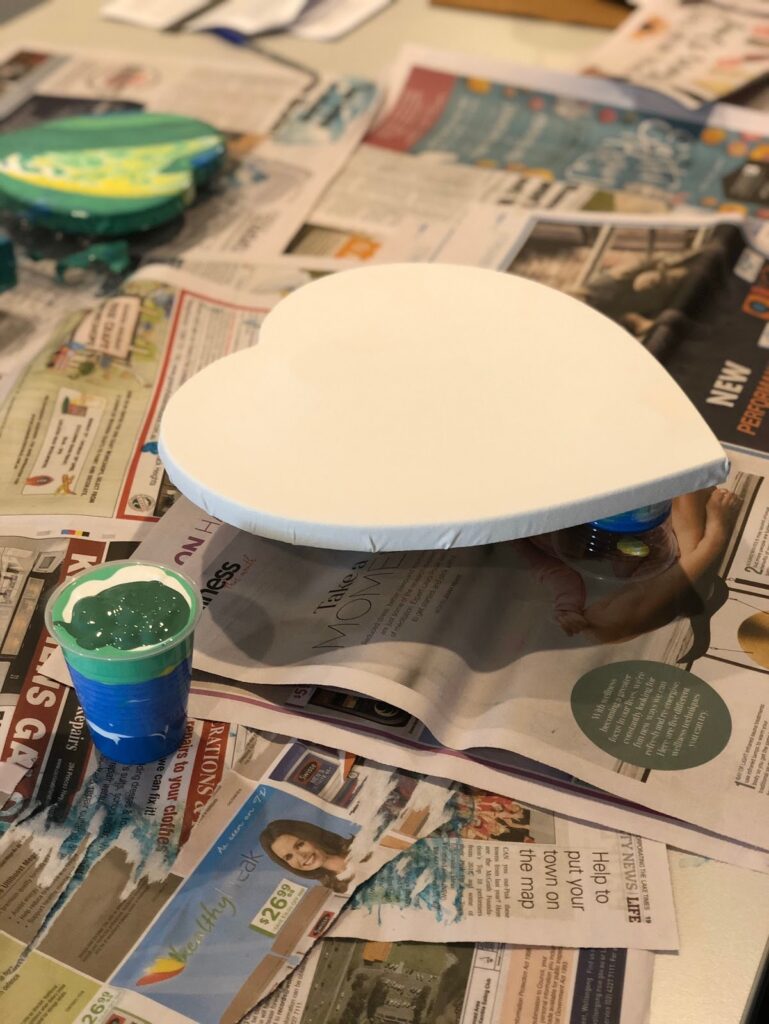
Then, I chose the colours that represented a healthy earth (green for trees and yellow for flowers) and a healthy atmosphere (blue for sky and white for clouds). The fun part begins when I start to pour paint on a white canvas.
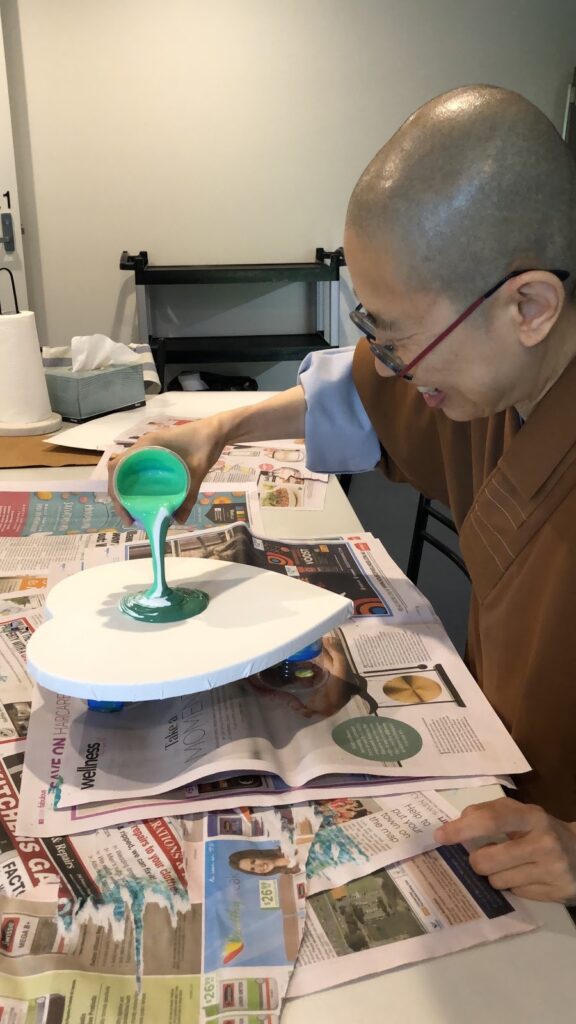
You see, there is very little the artist can do. I can only determine the colours, the amount of each colour, the layering of the colours, and perhaps, the direction the colours flow. But little else. I can swirl it around a little and make a mess of myself as the paint drips off the edges.
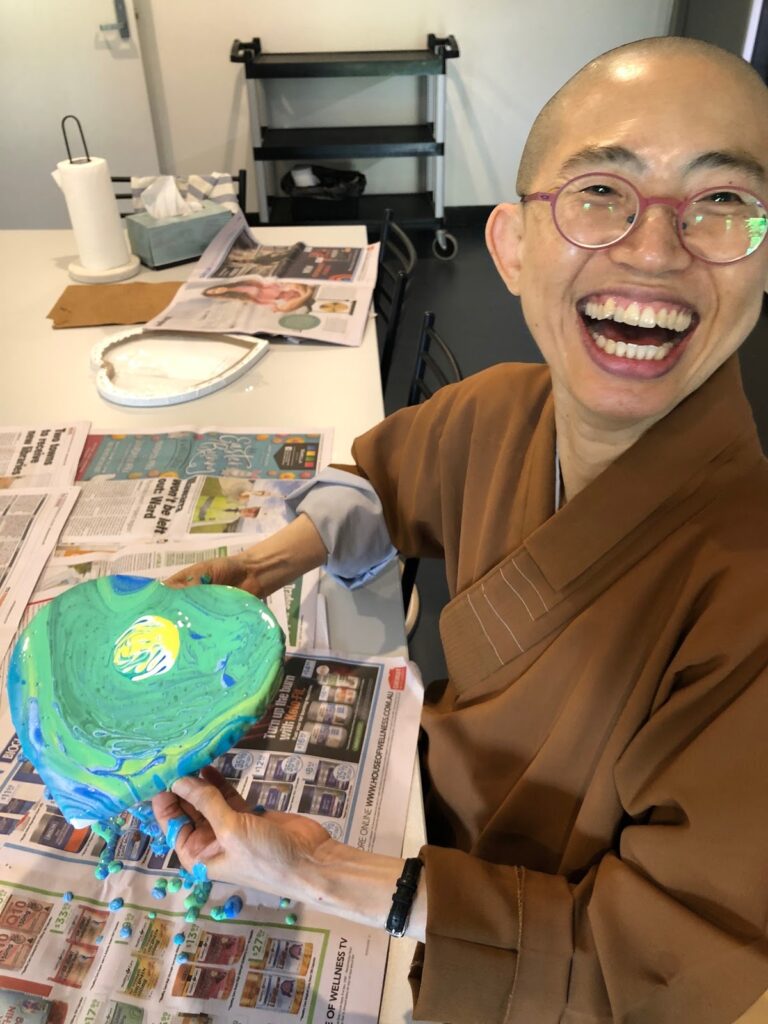
All I can do as the creator is to chant and let the magic happen. And indeed the magic happened—as the paint spreads, the colours became more harmonious, and as the paint dries, the colours became more vivid. What a wonderful lesson for the control freak in me: that after I put together the conditions the best manner possible, I must leave the rest to the flow. And the flow can be stunning!
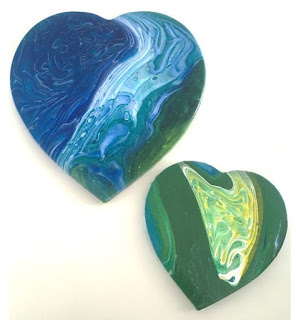
Here is a lesson for those of us compelled to work from home or be in self-isolation. There is no need to struggle or complain. Just go with the flow and have faith that harmony will prevail. It was my March 2020 lesson in non-self.
In his Prayer to Avalokitesvara Bodhisattva for Safety from the Novel Coronavirus Outbreak, Venerable Master Hsing Yun says,
If we all protect the environment and have respect for all lives, We shall be able to turn peril into safety.
This led me to my second piece of artwork.
III. Compassionate Isolation
To remind myself to be compassionate to all lives, I made myself a clay figurine. With the help of several Dharma brothers, I tried to make the sweetest possible face.
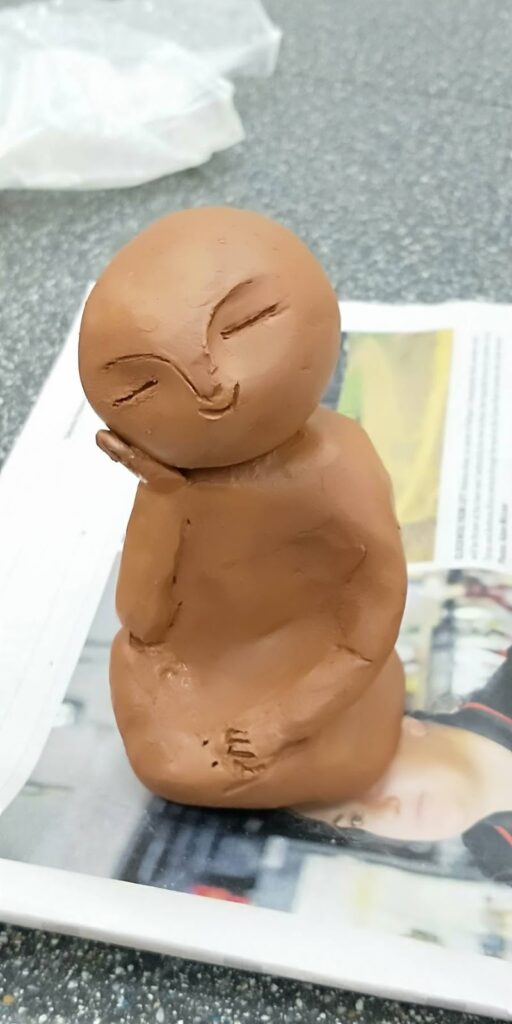
A look of contentment as the world swirls around in ways that we cannot comprehend. This VUCA world that is volatile, uncertain, complex and ambiguous needs a VUCA response that contains vision, understanding, compassion, and agility.
I have had a rather difficult adjustment period. Most people thought that I am IT-literate and I would not have any trouble. I hate to reveal that I am trained as a software engineer and not as a technician. I cannot troubleshoot nor can I set up systems for the life of me. My world is a conceptual world, not a practical hands-on one. So, when everyone works from home, I am now left with the tasks that were so well taken care of behind the scenes.This period has taught me to appreciate every connection, from administrative to infrastructural, that made things possible for the teachers to do our jobs. It is truly teamwork. I also have learned to realise why the Bodhisattva Avalokitesvara needs so many hands and eyes.

I am now learning little bits of Zoom and Facebook Live skills so that I can record this Dharma talk for those who wish to listen. I miss seeing my volunteers each month; I am disappointed that our Communities of Practice cannot be held on-site; and I was saddened that our carefully planned Study Tour to Fo Guang Shan had to be postponed. But perhaps we can be grateful to the technology of the day so that we can still fill in the social gaps and remain connected. We will be all the more appreciative and stronger by the time we meet again.
Now I truly see the Bodhisattva’s paramitas in action. It is times like this that we exercise generosity: to care with a connection via phone, email or video conference. Let’s not forget the disadvantaged such as the homeless who have no homes to isolate into or work from, and the elderly who may not make it into the grocery stores.
So, the least we can do is to exercise discipline. I recently learned to rebadge “self isolation” as “compassionate isolation.” Yes, we stay at home as a gift to the heavily burdened healthcare providers and to those who have nowhere else to go but live in the streets.
Let’s be patient too. I am really saying this to myself. I want so badly for all my projects for 2020 to go according to plan. But no one can tell me when this travel ban will end nor when life can return to normal. This is when I return to my clay figurine and tell myself that I should be grateful. Just be grateful and contented while at the same time pick up the new skills of the decade. Chan masters abide in the moment while patiently wait for the conditions to mature.
Making this clay figurine has taught me not to give up. I would not have made it if my earlier pieces were anything to go by. My earlier pieces had a lot of room for improvement or laughter. But if we press on, we may be surprised by what lies ahead. As long as we keep moving forward, the universe will meet us halfway.
IV. Digital Detoxing
So, here is another brainchild I came up with: a humanistic detox program that can be done in compassionate isolation. I started on my make-it-up-as-I-go-along detox program last week. I gave myself 24 hours to embark on this detox program that includes diet, exercise, meditation (both walking and sitting), journaling, and of course, sleep. Let me emphasise that I decided that it would be a digital detox as well since working remotely means that my hours before a screen has increased.
Let me share a few realisations with you today. As you may have guessed, throughout the 24 hours, I find myself wanting to turn on the computer or mobile phone. The silly reason may be to follow an exercise program online or to access my Mindful Check-In app! But I know what will happen once I turn on a device: I will check my emails and social media feeds. Checking for electronic inputs is now a reflex action, that is, it is no longer a conscious decision but a karmic habit. Why is that so? My preliminary thoughts are that without any digital input and output is equivalent to non-existence in the digital world. It goes back to my deep and innate sense of insecurity: for without a digital identity and presence, who am I? Theoretically knowing that I am nothing more than a construct is not enough. Realising it and being comfortable with it are much more difficult. That is probably what’s driving the panic buying we see in pharmacies and grocery stores. I am now more sympathetic towards the hoarders as this tanha or thirst is systemically programmed into our craving for survival. It takes education to become aware, and then practice to change our karmic tendency from survival mode to an ethical mode of compassion.
During this 24-hour detox session, I inadvertently ended up with an almost-liquid diet.This is because I am an iCook, that is, I can only cook when I have access to YouTube to show me how to cook. The implication of Digital Detox is that an iCook becomes severely handicapped. Unfortunately, I have earlier informed the Temple that I won’t be eating in the Dining Hall during this Detox period. Hence, I ended up eating only anything that can come out of a soup maker and direct from a box. As you may guess, there was a very hungry Juewei who truly appreciated every morsel of food prepared by the loving hands of the Nan Tien Temple kitchen.
On most days, I could ignore hunger pangs because I was distracted by the many tasks of the day. Without the benefit of such distraction, I found meditation the next best thing to do. True enough, once I settle into my breath focus, the body melted away and I did not want to face reality at all. The perfection of meditative concentration also helped me to appreciate why hunger and thirst are Mara’s strong armies for they can cause confusion and compel the individual to give up the practice for the sake of survival. During this period, I recalled not only the Buddha but also the Venerable Master and how they could become the great religious leaders they are today because of their ability to overcome bodily discomfort including hunger and thirst. I now have deeper understanding of Venerable Master Hsing Yun who said,
Without experiencing the hardest hardships, how can one rise above the ordinary? Not enduring suffering and not working hard, where can there be achievements?
The Four Noble Truths begin with the acknowledgement of existential difficulties in life. I am now starting to realise that those who can overcome one difficulty at a time, will eventually transcend any sense of suffering. Let the coronavirus be the friend that helps us to rise above the ordinary. We can learn to let go of some basic comforts through our practice of meditative concentration.
Perhaps one more realisation from this detox period to share. During my walking meditation, I sighted two teenage boys walking on the Institute grounds. I was not convinced that they had good intentions and I started to feel a little insecure. The first thought that came to my mind was to request for the shutting of the main gate so that trespassers could not enter. As I turned the corner, I saw our friendly and hardworking gardeners which made me feel immediately at ease. Ah, the same gate that let in the naughty boys also permitted the entry of my friends. The problem is not the gate but who I allow through the gates and my reaction to my guests. So, perhaps, the problem is not the entry of virus into the body but building our immunity through a good diet and exercise routine. We must still do our best to save ourselves from needless warfare through personal hygiene and compassionate isolation. However, we should also not forget to build up our immunity and friendship system in the event of an emergency. That to me is the sixth perfection of the bodhisattva: that of wisdom—understanding the nature of emptiness and our creative role.
I have personally benefited tremendously from my detox program—so much so that I would like now to extend the detox program to include the ten Maras in the Sutta Nipata. The Humanistic Buddhist detox program is to work on the toxins present in our minds through contemplations in our daily life. When I have further realisations, I look forward to sharing with you.
V. Conclusion
Thank you, as always, to your devotion to the humanistic Buddhist cause. When confronted with difficulties, many of us enter a default mode of trying to fix the situation immediately. I hope that today by my sharing my recent journey and forays will help you to find a little tip here and there. Take the time to celebrate successes with what you normally would not do, detox body and mind, but do not forget to turn to the Buddha, the humanistic Dharma, and a Sangha representative such as Venerable Master Hsing Yun for refuge and guidance. Together in friendship, we will overcome the virus out there and more importantly, the virus inside us.
Finally, I wish to dedicate the merits of our time together to all sentient beings with a prayer from the Venerable Master.
May you, your loved ones, your enemies, and all beings be safe and well.
